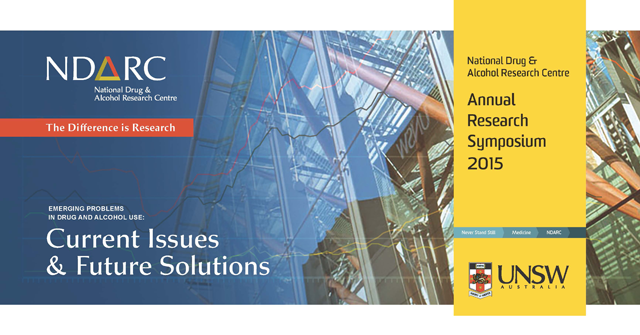The 2015 NDARC Annual Research Symposium was held on 15 September 2015. Thanks to all who attended and provided feedback about the day.
Links to the program and abstracts for the 2015 Symposium remain available below. We have also uploaded selected presentations and posters from the day.
For any additional queries, please contact ndarc.symposium@unsw.edu.au.
Presentations
Missed opportunities for early intervention in first episode psychosis in methamphetamine users - Dr Julia Lappin
Healthier Drinking Choices: A randomised controlled trial of a GP-facilitated web-based intervention for reducing risky alcohol consumption - Prof Maree Teesson
The Triple B Pregnancy Cohort Study: Alcohol use during pregnancy and developmental outcomes in infants at 12-months of age - Dr Delyse Hutchinson
Preliminary findings from an evaluation of an intervention for young people with multiple and complex needs - Alice Knight
Smoking cessation among low-socioeconomic status and disadvantaged population groups: A systematic review of research output - Dr Ryan Courtney
Posters
Stable housing, stable substance use Evaluation of two ‘Housing First’ programs for homeless individuals - Elizabeth Whittaker (Poster prize winner)
Systematic development of community-based interventions to reduce alcohol related-harms among Aboriginal people in rural NSW - Mieke Snijder
Preliminary findings from an evaluation of an intervention for young people with multiple and complex needs - Alice Knight
Prenatal alcohol consumption prior to pregnancy recognition - Clare McCormack
Download the full program booklet with all the abstracts and full list of posters (pdf).
| 8:30-9:00am | Registration |
| 9:00-9:05am | Acknowledgement of Country |
| 9:05-9:10am |
Welcome Professor Michael Farrell |
| 9:10-10:00am |
Keynote Address: Opportunities for intervention for methamphetamine Associate Professor Angela Hawken, Pepperdine University |
|
Session One: Shaping new interventions to evolving problems of ice use
Chair: Robyn Davies, Acting Director, Illicit Drugs, International and Research Policy, Drug Strategy Branch, Population Health Division, Australian Government Department of Health
|
|
| 10:00-10:15am |
Current trends in methamphetamine use Professor Michael Farrell |
| 10:15-10:30am |
Addressing the treatment gap: Lessons from a inner-city stimulant treatment program Dr Nadine Ezard |
| 10:30-10:45am |
Missed opportunities for early intervention in first episode psychosis in methamphetamine users Dr Julia Lappin |
| 10:45-11:15am | Morning Tea |
|
Session Two: Alcohol use from pregnancy to adolescence: Patterns and harms Chair: Conjoint Associate Professor Adrian Dunlop, School of Medicine and Public Health, Faculty of Health and Medicine, University of Newcastle |
|
| 11:15-11:30am |
The Triple B Pregnancy Cohort Study: Alcohol use during pregnancy and developmental outcomes in infants at 12-months of age Dr Delyse Hutchinson |
| 11:30-11:45am |
Social networks and the spread of alcohol use attitudes and behaviours among adolescents Associate Professor Tim Slade |
| 11:45-12:00pm |
Healthier Drinking Choices: A randomised controlled trial of a GP-facilitated web-based intervention for reducing risky alcohol consumption Professor Maree Teesson |
| 12:00-12:30pm | Five-minute poster presentations (for list, see Posters tab) |
| 12:30–1:30pm | Lunch |
| 1:30pm-2:00pm | Poster viewing. New this year: Your chance to vote for the People’s Choice Prize! |
|
Session Three: Economic evaluation of heroin treatments Chair: Professor Steve Allsop, Director, National Drug Research Institute (NDRI), Curtin University, Perth |
|
| 2.00pm -2:15pm |
Treatment for heroin users: Lifetime costs and benefits of treatment Dr Marian Shanahan |
| 2:15–2:30pm |
Economic evaluation comparing centre-based compulsory drug rehabilitation with community-based methadone treatment in Hai Phong City, Vietnam Thu Vuong |
| 2:30–3:30 | Breakout sessions |
| Breakout One: Pharmaceutical opioids: Use, dependence and treatment | |
|
Increasing prescribing of pharmaceutical opioids in Australia has led to concerns about harms and treatment effectiveness. This session will examine findings from Australia’s first and largest prospective cohort study of nearly 2,000 people prescribed opioids for non-cancer pain. The presentations will look at patterns of use and harms; medication control and treatment. Panel: Gabrielle Campbell, Dr Briony Larance, Dr Suzanne Nielsen |
|
| Breakout Two: Mental health, substance use and young people | |
|
This session will look at the evidence for effective prevention of both mental health problems and substance use in young people. It will also explore young people’s reasons for drinking and how that impacts prevention, and examine the mental health outcomes for young adult cannabis users and past users. Panel: Dr Nicola Newton, Dr Edmund Silins, Dr Emily Stockings, Dr Lexine Stapinski |
|
| Breakout Three: The ‘dark web’ and new psychoactive substances | |
|
Increasing use of new psychoactive substances (NPS) and the use of the internet to purchase these and other drugs is an increasing concern in Australia and overseas. This session will look at the ‘dark web’ and present a new online prevention program specially targeted at users of ecstasy and NPS. Panel: Joe Van Buskirk, Rachel Sutherland, Dr Monica Barratt, Katrina Champion |
|
| Breakout Four: Suicide risk assessment and management in D&A services | |
|
Suicide risk is elevated among substance users and poses a major clinical challenge for staff working in drug and alcohol treatment services. The Suicide Assessment Kit (SAK) is an evidence-based resource developed by NDARC and the Network of Alcohol and other Drug Agencies (NADA). This workshop will provide an overview of the SAK resources and demonstrate how policies and procedures can be integrated around the kit. Facilitators: Professor Shane Darke, Dr Joanne Ross, Sarah Green (Mission Australia Triple Care Farm) |
|
| Breakout Five: Skills-based workshop: Very brief interventions for cannabis use | |
|
This workshop will look at Very Brief Interventions (VBIs) for clients who are indirectly experiencing problems as a result of their cannabis use and are at risk of developing long-term cannabis dependence. VBIs typically include a brief assessment/screen, feedback, psycho-education, self-help material and assessment of motivation for change. This VBI is designed to be delivered opportunistically and is appropriate for people who have not specifically sought help for their cannabis use but whose use is detected as being risky. Facilitator: Etty Matalon (National Cannabis Prevention and Information Centre) |
|
| 3:30pm–4:00pm | Afternoon tea and poster viewing |
| 4:00pm -4.10pm | Poster prize and People’s Choice winners announced |
| 4:10-4:55pm |
PANEL DISCUSSION Methamphetamine: Problems And Solutions Chair: Professor Michael Farrell (National Drug and Alcohol Research Centre) |
| 4:55–5:00pm |
Closing Remarks Professor Michael Farrell |
Keynote
 Angela Hawken is an Associate Professor of economics and policy analysis at the School of Public Policy, Pepperdine University, CA, United States. Hawken's research team focuses on drugs, crime, and corruption. She is the principal investigator of several studies that test swift, certain, and fair (SCF) strategies to reduce recidivism and incarceration. She led the randomized controlled trials of HOPE probation in Hawaii and the SCF pilot in Seattle (called WISP). She works with 11 states and an Indian nation on implementation of SCF probation and parole, on behalf of the U.S. Department of Justice. Hawken is the director of BetaGov, a centre for practitioner-led trials that provides tools to conduct experimental tests of operations and policies; the goal is to dramatically increase the pace of learning which innovations are promising – and which are not – in criminal-justice and other policy areas. She has conducted research and advised policymakers in South Africa, Afghanistan, Syria, the country of Georgia, and the United Nations. She has co-authored two chapters in the United Nations Human Development Report, and is a co-author of Drugs and Drug Policy: What Everyone Needs to Know and Marijuana Legalization: What Everyone Needs to Know (both Oxford University Press).
Angela Hawken is an Associate Professor of economics and policy analysis at the School of Public Policy, Pepperdine University, CA, United States. Hawken's research team focuses on drugs, crime, and corruption. She is the principal investigator of several studies that test swift, certain, and fair (SCF) strategies to reduce recidivism and incarceration. She led the randomized controlled trials of HOPE probation in Hawaii and the SCF pilot in Seattle (called WISP). She works with 11 states and an Indian nation on implementation of SCF probation and parole, on behalf of the U.S. Department of Justice. Hawken is the director of BetaGov, a centre for practitioner-led trials that provides tools to conduct experimental tests of operations and policies; the goal is to dramatically increase the pace of learning which innovations are promising – and which are not – in criminal-justice and other policy areas. She has conducted research and advised policymakers in South Africa, Afghanistan, Syria, the country of Georgia, and the United Nations. She has co-authored two chapters in the United Nations Human Development Report, and is a co-author of Drugs and Drug Policy: What Everyone Needs to Know and Marijuana Legalization: What Everyone Needs to Know (both Oxford University Press).
Session One
 Professor Michael Farrell is the Director of NDARC. He moved to Sydney from London in March 2011 following his appointment to NDARC. Prior to joining NDARC he was Professor of Addiction Psychiatry at the Institute of Psychiatry at Kings College London. His extensive research interests include treatment evaluation, including the development of the National Treatment Outcomes Profile, a brief outcomes measurement instrument for drug and alcohol dependence. He has a long standing interest in drug dependence in prisons and within the wider criminal justice system. He has been a member of the WHO Expert Committee on Drug and Alcohol Dependence since 1995 and chaired the WHO External Evaluation of the Swiss Heroin Trial.
Professor Michael Farrell is the Director of NDARC. He moved to Sydney from London in March 2011 following his appointment to NDARC. Prior to joining NDARC he was Professor of Addiction Psychiatry at the Institute of Psychiatry at Kings College London. His extensive research interests include treatment evaluation, including the development of the National Treatment Outcomes Profile, a brief outcomes measurement instrument for drug and alcohol dependence. He has a long standing interest in drug dependence in prisons and within the wider criminal justice system. He has been a member of the WHO Expert Committee on Drug and Alcohol Dependence since 1995 and chaired the WHO External Evaluation of the Swiss Heroin Trial.
 Dr Nadine Ezard MBBS BA MPH PhD FAChAM is the Clinical Director of the Alcohol and Drug Service, St Vincent’s Hospital, Sydney, Australia and conjoint Associate Professor, St Vincent’s Hospital Clinical School, Faculty of Medicine, UNSW. A founding fellow of the Australasian Chapter of Addiction Medicine, A/Prof Ezard has worked with drug and alcohol users for over 20 years both in Australia and overseas. A member of the NSW Expert Advisory Group on Methamphetamine, she currently directs Sydney’s only specialist Stimulant Treatment Program, an innovative service providing treatment for an increasing number of people with methamphetamine use disorders since 2006. She has published in the peer reviewed literature and presents at international and national conferences and is regularly requested to provide expert opinion in the media.
Dr Nadine Ezard MBBS BA MPH PhD FAChAM is the Clinical Director of the Alcohol and Drug Service, St Vincent’s Hospital, Sydney, Australia and conjoint Associate Professor, St Vincent’s Hospital Clinical School, Faculty of Medicine, UNSW. A founding fellow of the Australasian Chapter of Addiction Medicine, A/Prof Ezard has worked with drug and alcohol users for over 20 years both in Australia and overseas. A member of the NSW Expert Advisory Group on Methamphetamine, she currently directs Sydney’s only specialist Stimulant Treatment Program, an innovative service providing treatment for an increasing number of people with methamphetamine use disorders since 2006. She has published in the peer reviewed literature and presents at international and national conferences and is regularly requested to provide expert opinion in the media.
Dr Julia Lappin is a Senior Lecturer in the Department of Psychiatry and at the National Drug and Alcohol Research Centre (NDARC) at UNSW. Julia's research has employed epidemiology and neuroimaging to investigate psychotic illness, particularly the early course of psychosis, and clinical and functional outcomes over time. She has continued involvement in the AESOP10 study, a large sample of individuals followed for 10 years after first treatment for psychotic illness. She has a strong interest in improving outcomes for individuals with psychosis, through optimising treatments and services, not only for psychosis itself but also for common comorbid difficulties, including poor physical health, and alcohol and/or substance misuse. Julia trained in Psychiatry at the Maudsley Hospital where she went on to manage Early Intervention Services as lead psychiatrist. She completed her PhD at the Institute of Psychiatry, London. She has a background in teaching Clinical and Communication Skills, and co-developed and ran a Masters course in Early Intervention in Psychosis at the Institute of Psychiatry until 2014 when she took up her current post at UNSW Australia.
Session Two
 Dr Delyse Hutchinson is a Senior Research Fellow at NDARC and a Senior Research Fellow at the Centre for Social and Early Emotional Development at Deakin University. Her current research focuses on two main areas: the impact of parental substance use on children and families; and identification of risk and protective factors for the development of adolescent substance misuse. She is currently involved in collaborative research with national agencies conducting large-scale cohort studies to examine the relations between family functioning, parenting and substance misuse. Dr Hutchinson recent published works have contributed to an improved understanding of the impacts of drug use in the family context, and provide guidance for parents with respect to managing alcohol and other drug related issues in the home.
Dr Delyse Hutchinson is a Senior Research Fellow at NDARC and a Senior Research Fellow at the Centre for Social and Early Emotional Development at Deakin University. Her current research focuses on two main areas: the impact of parental substance use on children and families; and identification of risk and protective factors for the development of adolescent substance misuse. She is currently involved in collaborative research with national agencies conducting large-scale cohort studies to examine the relations between family functioning, parenting and substance misuse. Dr Hutchinson recent published works have contributed to an improved understanding of the impacts of drug use in the family context, and provide guidance for parents with respect to managing alcohol and other drug related issues in the home.
 A/Prof Tim Slade is a psychologist trained in biostatistics and is director of the epidemiology research stream of the NHMRC Centre of Research Excellence in Mental Health and Substance Use, based at NDARC. His research interests include the classification of mental disorders, particularly the categorical versus dimensional status of psychiatric disorders, and the epidemiology of mental and substance use disorders, including the epidemiology of alcohol use and alcohol use disorders in young adults.
A/Prof Tim Slade is a psychologist trained in biostatistics and is director of the epidemiology research stream of the NHMRC Centre of Research Excellence in Mental Health and Substance Use, based at NDARC. His research interests include the classification of mental disorders, particularly the categorical versus dimensional status of psychiatric disorders, and the epidemiology of mental and substance use disorders, including the epidemiology of alcohol use and alcohol use disorders in young adults.
 Professor Maree Teesson is an NHMRC Principal Research Fellow at the National Drug and Alcohol Research Centre, University of New South Wales, and Director of the NHMRC Centre of Research Excellence in Mental Health and Substance Use. Prof Teesson has made a major contribution to Australia’s health and medical research effort in the field of mental health and substance use. In particular, she is known nationally and internationally for her research on the comorbidity between mental health and substance use disorders. She was elected as inaugural fellow of the Australian Academy of Health Sciences in 2015.
Professor Maree Teesson is an NHMRC Principal Research Fellow at the National Drug and Alcohol Research Centre, University of New South Wales, and Director of the NHMRC Centre of Research Excellence in Mental Health and Substance Use. Prof Teesson has made a major contribution to Australia’s health and medical research effort in the field of mental health and substance use. In particular, she is known nationally and internationally for her research on the comorbidity between mental health and substance use disorders. She was elected as inaugural fellow of the Australian Academy of Health Sciences in 2015.
Session Three
 Dr Marian Shanahan is a member of the Drug Policy Modelling Program (DPMP) team. Current interests include assessing the costs and benefits of policies for heroin, cannabis and other illicit drugs; using discrete choice experiments to explore societal preferences for drugs policies; and assessing the costs and outcomes of police diversion programs for cannabis. Dr Shanahan is an experienced health economist who has applied health economics principles to a diverse range of disease and structural issues in the health sector. This includes analysing large linked data sets, assessing hospital efficiency and the introduction of new technologies. She has been involved in evaluations of a number of pharmacotherapies and other treatments for illicit drug and alcohol misuse.
Dr Marian Shanahan is a member of the Drug Policy Modelling Program (DPMP) team. Current interests include assessing the costs and benefits of policies for heroin, cannabis and other illicit drugs; using discrete choice experiments to explore societal preferences for drugs policies; and assessing the costs and outcomes of police diversion programs for cannabis. Dr Shanahan is an experienced health economist who has applied health economics principles to a diverse range of disease and structural issues in the health sector. This includes analysing large linked data sets, assessing hospital efficiency and the introduction of new technologies. She has been involved in evaluations of a number of pharmacotherapies and other treatments for illicit drug and alcohol misuse.
 Thu Vuong obtained a Master Degree in Public Health from Ohio State University in the USA in 2006 while on a Fulbright scholarship. The focus of her Masters study was health services management and policy. Since February 2012 she has been pursuing her PhD in drug policy research via scholarships from the Australian Government's Endeavour Award and the National Drug and Alcohol Research Centre. The focus of her PhD is an economic evaluation of compulsory centres for drug users in Vietnam compared to community-based methadone maintenance treatment. Professionally, Thu has had 18 years of experience in public health work in the areas of HIV and drug policy. She has spent most of her career working for global development organisation FHI 360 in Vietnam. She is a key facilitator between the international community and the Government of Vietnam, working to achieve consensus on the most feasible ways to improve drug policy in Vietnam.
Thu Vuong obtained a Master Degree in Public Health from Ohio State University in the USA in 2006 while on a Fulbright scholarship. The focus of her Masters study was health services management and policy. Since February 2012 she has been pursuing her PhD in drug policy research via scholarships from the Australian Government's Endeavour Award and the National Drug and Alcohol Research Centre. The focus of her PhD is an economic evaluation of compulsory centres for drug users in Vietnam compared to community-based methadone maintenance treatment. Professionally, Thu has had 18 years of experience in public health work in the areas of HIV and drug policy. She has spent most of her career working for global development organisation FHI 360 in Vietnam. She is a key facilitator between the international community and the Government of Vietnam, working to achieve consensus on the most feasible ways to improve drug policy in Vietnam.
Breakout Sessions
Breakout one: Pharmaceutical opioids: use, dependence and treatment
 Professor Louisa Degenhardt has worked at theNDARC since 1998 across a wide range of projects examining the epidemiology of illicit drug use, comorbid mental health problems, and illicit drug surveillance. LHer increasingly diverse epidemiological studies, includeexamination of mortality related to opioid antagonist treatment; post marketing surveillance of new opioid agonist pharmacotherapies; cohort studies using data linkage methods of opioid treatment entrants; indirect prevalence estimation studies of opioid dependence; ; studies of drug overdose and international studies of the epidemiology of drug use and dependence. She is currently conducting a national prospective cohort study of entrants to pharmaceutical opioid use for the treatment of chronic non-cancer pain.
Professor Louisa Degenhardt has worked at theNDARC since 1998 across a wide range of projects examining the epidemiology of illicit drug use, comorbid mental health problems, and illicit drug surveillance. LHer increasingly diverse epidemiological studies, includeexamination of mortality related to opioid antagonist treatment; post marketing surveillance of new opioid agonist pharmacotherapies; cohort studies using data linkage methods of opioid treatment entrants; indirect prevalence estimation studies of opioid dependence; ; studies of drug overdose and international studies of the epidemiology of drug use and dependence. She is currently conducting a national prospective cohort study of entrants to pharmaceutical opioid use for the treatment of chronic non-cancer pain.
 Gabrielle Campbell is a Senior Research Officer at NDARC Centre and coordinates a large prospective study examining the benefits and outcomes of prescription opioids for chronic pain, the Pain and Opioids IN Treatment (POINT) study. Gabrielle has a Masters of Criminology and is currently completing her PhD examining the association between suicidality and chronic non-cancer pain. Gabrielle joined NDARC in 2006 and has worked the Triple B cohort study investigating the impact of parental substance use on pregnancy and infant development. Gabrielle was previously the ACT and NT coordinator of the Illicit Drug Reporting System (IDRS) and the Ecstasy and Related Drugs Reporting System (EDRS) and coordinated the Clubbing and Driving project.
Gabrielle Campbell is a Senior Research Officer at NDARC Centre and coordinates a large prospective study examining the benefits and outcomes of prescription opioids for chronic pain, the Pain and Opioids IN Treatment (POINT) study. Gabrielle has a Masters of Criminology and is currently completing her PhD examining the association between suicidality and chronic non-cancer pain. Gabrielle joined NDARC in 2006 and has worked the Triple B cohort study investigating the impact of parental substance use on pregnancy and infant development. Gabrielle was previously the ACT and NT coordinator of the Illicit Drug Reporting System (IDRS) and the Ecstasy and Related Drugs Reporting System (EDRS) and coordinated the Clubbing and Driving project.
 Dr Briony Larance is an NHMRC Australian Public Health Early Career Fellowship recipient and has worked at NDARC since 2004. Her research interests include opioid dependence, opioid substitution therapy and pharmaceutical opioids. Her research focuses on understanding the trajectories and health consequences of pharmaceutical opioid use among diverse populations, including chronic pain patients and people who are opioid dependent and/or inject drugs. She has been involved in epidemiological and clinical studies utilising a range of methods, including randomised-controlled trials, post-marketing surveillance studies, analyses of linked administrative data and cohort studies. Current research projects include a large cohort study of patients being prescribed opioids for non-cancer pain; post-marketing surveillance studies of a tamper-resistant formulation of oxycodone; piloting interventions to improve the treatment of pain and the prescribing of pharmaceutical opioids in general practice; and a multi-site collaboration examining the pharmacoepidemiology of opioid use in Australia.
Dr Briony Larance is an NHMRC Australian Public Health Early Career Fellowship recipient and has worked at NDARC since 2004. Her research interests include opioid dependence, opioid substitution therapy and pharmaceutical opioids. Her research focuses on understanding the trajectories and health consequences of pharmaceutical opioid use among diverse populations, including chronic pain patients and people who are opioid dependent and/or inject drugs. She has been involved in epidemiological and clinical studies utilising a range of methods, including randomised-controlled trials, post-marketing surveillance studies, analyses of linked administrative data and cohort studies. Current research projects include a large cohort study of patients being prescribed opioids for non-cancer pain; post-marketing surveillance studies of a tamper-resistant formulation of oxycodone; piloting interventions to improve the treatment of pain and the prescribing of pharmaceutical opioids in general practice; and a multi-site collaboration examining the pharmacoepidemiology of opioid use in Australia.
 Dr Suzanne Nielsen completed her PhD at Monash University in 2008, investigating opioid and benzodiazepine interactions, and the impact of their concurrent use on the safety opioid substitution treatment. In 2010-11 she was awarded a NIDA Clinical Trials Network INVEST Fellowship, and spent 18 months in Los Angeles at UCLA Integrated Substance Abuse Programs, working on national multisite clinical trials using medications for opioid and cocaine dependence. In 2011 Suzanne was awarded a NHMRC Early Career Fellowship, and she joined NDARC in 2014. Her current work is focussed on identifying and responding to prescription and over-the-counter drug related problems. She is involved in a number of prospective cohort studies examining the complex trajectories of problematic prescription and over-the-counter drug use and in the POINT study looking at outcomes for people prescribed opioids for non-cancer chronic pain. Suzanne has 15 years clinical experience as a pharmacist in substance dependence treatment settings having worked in both specialist treatment and community based alcohol and drug settings.
Dr Suzanne Nielsen completed her PhD at Monash University in 2008, investigating opioid and benzodiazepine interactions, and the impact of their concurrent use on the safety opioid substitution treatment. In 2010-11 she was awarded a NIDA Clinical Trials Network INVEST Fellowship, and spent 18 months in Los Angeles at UCLA Integrated Substance Abuse Programs, working on national multisite clinical trials using medications for opioid and cocaine dependence. In 2011 Suzanne was awarded a NHMRC Early Career Fellowship, and she joined NDARC in 2014. Her current work is focussed on identifying and responding to prescription and over-the-counter drug related problems. She is involved in a number of prospective cohort studies examining the complex trajectories of problematic prescription and over-the-counter drug use and in the POINT study looking at outcomes for people prescribed opioids for non-cancer chronic pain. Suzanne has 15 years clinical experience as a pharmacist in substance dependence treatment settings having worked in both specialist treatment and community based alcohol and drug settings.
Breakout two: Mental health, substance use and young people
 Dr Nicola Newton is a Senior Research Fellow at NDARC.). She leads a program of research developing and evaluating innovative approaches to the prevention of alcohol and other drug use in adolescents. Her main focus is on developing internet-based preventive interventions and improving the sustainability and translation of programs into schools. Nicola has worked extensively on the Climate Schools series for drug prevention which have been adapted for use in the US and the UK. She recently returned from London where she spent two years of her post doctorate fellowship working at the Institute of Psychiatry, Kings College London. This work formed the basis of her most current research examining the efficacy of an integrated approach to prevention by combining universal and personality-targeted interventions.
Dr Nicola Newton is a Senior Research Fellow at NDARC.). She leads a program of research developing and evaluating innovative approaches to the prevention of alcohol and other drug use in adolescents. Her main focus is on developing internet-based preventive interventions and improving the sustainability and translation of programs into schools. Nicola has worked extensively on the Climate Schools series for drug prevention which have been adapted for use in the US and the UK. She recently returned from London where she spent two years of her post doctorate fellowship working at the Institute of Psychiatry, Kings College London. This work formed the basis of her most current research examining the efficacy of an integrated approach to prevention by combining universal and personality-targeted interventions.
 Dr Edmund Silins is a Research Fellow at NDARC. His main research interest is in longitudinal cohort research which addresses psychosocial issues relevant to adolescents and young adults. Currently his work is focussed on the mental health and psychosocial consequences of drug use, particularly alcohol and cannabis use. He’s involved in an innovative and large-scale study which is integrating data from four long-running Australasian longitudinal cohorts to examine the linkages between adolescent binge drinking and life-course outcomes. Projects Dr Silins has been involved in outside his current work include developing an interactive computer based drug prevention program for school-age children; peer-led interventions among ecstasy users; and examining the drug filtration practices of clients of a medically supervised injecting centre.
Dr Edmund Silins is a Research Fellow at NDARC. His main research interest is in longitudinal cohort research which addresses psychosocial issues relevant to adolescents and young adults. Currently his work is focussed on the mental health and psychosocial consequences of drug use, particularly alcohol and cannabis use. He’s involved in an innovative and large-scale study which is integrating data from four long-running Australasian longitudinal cohorts to examine the linkages between adolescent binge drinking and life-course outcomes. Projects Dr Silins has been involved in outside his current work include developing an interactive computer based drug prevention program for school-age children; peer-led interventions among ecstasy users; and examining the drug filtration practices of clients of a medically supervised injecting centre.
 Dr Emily Stockings has been a Postdoctoral since August, 2013. She completed her PhD at the University of Newcastle examining the feasibility, acceptability and efficacy of an integrated smoking cessation treatment model within inpatient and community mental health services. She has experience in the design, implementation and evaluation of randomised controlled trials, with a focus on evidence-based substance use treatment interventions for people with a mental disorder. Emily is currently working with the Centre for Research Excellence in Mental Health Systems Improvement (CREMSI) developing an evidence base for the cost-effectiveness of preventive mental health interventions.
Dr Emily Stockings has been a Postdoctoral since August, 2013. She completed her PhD at the University of Newcastle examining the feasibility, acceptability and efficacy of an integrated smoking cessation treatment model within inpatient and community mental health services. She has experience in the design, implementation and evaluation of randomised controlled trials, with a focus on evidence-based substance use treatment interventions for people with a mental disorder. Emily is currently working with the Centre for Research Excellence in Mental Health Systems Improvement (CREMSI) developing an evidence base for the cost-effectiveness of preventive mental health interventions.
 Dr Lexine Stapinski is a Research Fellow at NDARC. In her current role she manages a collaborative project with the Department of Health to develop and disseminate illicit drug resources for Australian teachers, parents and students. More broadly, Lexine is interested in research examining risk factors and effective interventions for alcohol and substance misuse. She has a particular interest in the inter-relationship between anxiety and substance use. Lexine is also a registered clinical psychologist, with particular expertise in the treatment of anxiety and alcohol use disorders.
Dr Lexine Stapinski is a Research Fellow at NDARC. In her current role she manages a collaborative project with the Department of Health to develop and disseminate illicit drug resources for Australian teachers, parents and students. More broadly, Lexine is interested in research examining risk factors and effective interventions for alcohol and substance misuse. She has a particular interest in the inter-relationship between anxiety and substance use. Lexine is also a registered clinical psychologist, with particular expertise in the treatment of anxiety and alcohol use disorders.
Breakout Three: Silk Road and NPS
 Joe Van Buskirk joined NDARC in August 2011 and runs the Internet Monitoring arm of the Drug Trends Project (DNeT) looking at online availability of illicit and emerging substances. Joe completed a Bachelor of Psychology (Honours) in 2010 and his previous research areas have focussed on Learning Theory and Cognitive Neuroscience.
Joe Van Buskirk joined NDARC in August 2011 and runs the Internet Monitoring arm of the Drug Trends Project (DNeT) looking at online availability of illicit and emerging substances. Joe completed a Bachelor of Psychology (Honours) in 2010 and his previous research areas have focussed on Learning Theory and Cognitive Neuroscience.
Rachel Sutherland joined NDARC in April 2007 and is currently working as the South Australian co-ordinator for the Ecstasy and Related Drugs Reporting System (EDRS) and the Illicit Drug Reporting System (IDRS). Prior to this, she worked as a research officer on the Methamphetamine Treatment Evaluation Study (MATES), as well as being involved in projects such as: A Systematic Review of Methamphetamine Precursor Regulations; Harm Reduction in NSW Prisons: What can be done to prevent HCV among prisoners? , Rachel completed her honours degree in Criminology at the University of New South Wales. and is currently undertaking her PhD looking at new psychoactive substances, on an NDARC scholarship. Her other research interests include substance use and mental health disorders, homelessness, transition from prison and post-release support.
 Dr Monica Barratt joined the Drug Policy Modelling Program at NDARC in 2014 after being awarded an NHMRC post-doctoral fellowship. Monica's research focusses on the social and public health implications of internet technologies for people who use illicit and emerging psychoactive drugs, and the impacts of legislative responses to drug use and drug problems. Monica is particularly interested in how we respond to the emergence of new/novel drug trends and how these trends and responses are enabled by digital technologies. She specialises in engaging hard-to-reach networks and groups in digital spaces in conversations about research and policy. Through this engagement, Monica's work acts as a conduit between these groups and policy makers, and contributes to policy change. Prior to her current appointment, Monica worked as a Research Fellow at the National Drug Research Institute, Curtin University, where she also completed her postgraduate studies.
Dr Monica Barratt joined the Drug Policy Modelling Program at NDARC in 2014 after being awarded an NHMRC post-doctoral fellowship. Monica's research focusses on the social and public health implications of internet technologies for people who use illicit and emerging psychoactive drugs, and the impacts of legislative responses to drug use and drug problems. Monica is particularly interested in how we respond to the emergence of new/novel drug trends and how these trends and responses are enabled by digital technologies. She specialises in engaging hard-to-reach networks and groups in digital spaces in conversations about research and policy. Through this engagement, Monica's work acts as a conduit between these groups and policy makers, and contributes to policy change. Prior to her current appointment, Monica worked as a Research Fellow at the National Drug Research Institute, Curtin University, where she also completed her postgraduate studies.
 Katrina Champion joined NDARC in November 2011 as a Research Assistant working on the CAP Study, a NHMRC funded randomised controlled trial of a substance use prevention program in adolescents. She is currently completing her PhD under the supervision of Dr Nicola Newton and Professor Maree Teesson. Her thesis will involve developing and evaluating the Climate Schools: Ecstasy & Emerging Drugs module, an online school-based prevention program designed to educate adolescents about the harms associated with illicit drug use. Katrina has previously completed a Bachelor of Arts – Psychology (Honours) and a Bachelor of Health at Macquarie University. Her areas of interest include the prevention of substance use among adolescents and internet-based interventions for substance use and related co-morbid mental health problems.
Katrina Champion joined NDARC in November 2011 as a Research Assistant working on the CAP Study, a NHMRC funded randomised controlled trial of a substance use prevention program in adolescents. She is currently completing her PhD under the supervision of Dr Nicola Newton and Professor Maree Teesson. Her thesis will involve developing and evaluating the Climate Schools: Ecstasy & Emerging Drugs module, an online school-based prevention program designed to educate adolescents about the harms associated with illicit drug use. Katrina has previously completed a Bachelor of Arts – Psychology (Honours) and a Bachelor of Health at Macquarie University. Her areas of interest include the prevention of substance use among adolescents and internet-based interventions for substance use and related co-morbid mental health problems.
Breakout four: Suicide risk assessment in D&A treatment
 Professor Shane Darke has worked in the field of illicit drug research at NDARC since 1988. His area of research is the harm associated with illicit drug use, with a particular focus on mortality. He has published widely in the area of illicit drug use, including work on opioid overdose, psychostimulant overdose, psychopathology, suicide, trauma, treatment outcome and toxicology, and was among the 250 most cited sociology researchers in the world between 2000-2008, according to Thompson Reuters' Highly Cited Research. He was a senior investigator for the Australian Treatment Outcome Study, the first longitudinal study of outcome for the treatment of heroin dependence among different treatment modalities to be conducted in Australia. He is currently supervising projects on methamphetamine toxicity, methamphetamine and violence, and the toxicology of suicide victims. Professor Darke's research interests include: Heroin overdose, psychopathology and drug dependence, suicide and drug use, and drug-related trauma.
Professor Shane Darke has worked in the field of illicit drug research at NDARC since 1988. His area of research is the harm associated with illicit drug use, with a particular focus on mortality. He has published widely in the area of illicit drug use, including work on opioid overdose, psychostimulant overdose, psychopathology, suicide, trauma, treatment outcome and toxicology, and was among the 250 most cited sociology researchers in the world between 2000-2008, according to Thompson Reuters' Highly Cited Research. He was a senior investigator for the Australian Treatment Outcome Study, the first longitudinal study of outcome for the treatment of heroin dependence among different treatment modalities to be conducted in Australia. He is currently supervising projects on methamphetamine toxicity, methamphetamine and violence, and the toxicology of suicide victims. Professor Darke's research interests include: Heroin overdose, psychopathology and drug dependence, suicide and drug use, and drug-related trauma.
 Dr Joanne Ross is a Senior Lecturer at the National Drug and Alcohol Research Centre and has over 20 years experience in drug and alcohol research. Joanne was awarded her PhD in 1999 for her work on benzodiazepine use among heroin users, and is also a Clinical Psychologist. Her research interests include treatment outcomes for substance use disorder, and the development of clinical interventions for the treatment of psychiatric comorbidity. Joanne was the principle investigator on the Suicide Risk Assessment study that led to the development of the Suicide Assessment Kit, and is currently directing an NHMRC funded clinical trial of behavioural activation for the treatment of depression among substance users.
Dr Joanne Ross is a Senior Lecturer at the National Drug and Alcohol Research Centre and has over 20 years experience in drug and alcohol research. Joanne was awarded her PhD in 1999 for her work on benzodiazepine use among heroin users, and is also a Clinical Psychologist. Her research interests include treatment outcomes for substance use disorder, and the development of clinical interventions for the treatment of psychiatric comorbidity. Joanne was the principle investigator on the Suicide Risk Assessment study that led to the development of the Suicide Assessment Kit, and is currently directing an NHMRC funded clinical trial of behavioural activation for the treatment of depression among substance users.
 Sarah Green is the Senior Psychologist at Mission Australia’s Triple Care Farm, in the Southern Highlands NSW. In addition to direct clinical work, Sarah supports the interdisciplinary team at Triple Care Farm, through program evaluation and specialised client assessment within both the mental health and education settings. Sarah is also a registered Applied Suicide Intervention Skills (ASIST) Trainer, and works with community members and organisations to achieve confidence in supporting people with suicide behaviours. Sarah has studied a Masters of Forensic Mental Health and is also a member of the Network of Alcohol and other Drug Agencies (NADA) Practice Leadership Group, and chairs Mission Australia’s Youth AOD Community of Practice.
Sarah Green is the Senior Psychologist at Mission Australia’s Triple Care Farm, in the Southern Highlands NSW. In addition to direct clinical work, Sarah supports the interdisciplinary team at Triple Care Farm, through program evaluation and specialised client assessment within both the mental health and education settings. Sarah is also a registered Applied Suicide Intervention Skills (ASIST) Trainer, and works with community members and organisations to achieve confidence in supporting people with suicide behaviours. Sarah has studied a Masters of Forensic Mental Health and is also a member of the Network of Alcohol and other Drug Agencies (NADA) Practice Leadership Group, and chairs Mission Australia’s Youth AOD Community of Practice.
Breakout five: Skills based workshop
 Etty Matalon is a clinical psychologist and the National Clinical Training Manager for the National Cannabis Prevention and Information Centre (NCPIC). She consultant is past State President of the Australian Association for Cognitive and Behaviour Therapy for five years. Etty has 20 years clinical experience in the Alcohol and Other Drug field having worked at two major teaching hospitals in Sydney; as the clinical co-ordinator for a women’s detoxification and rehabilitation service where she introduced a Cognitive Behavioural Treatment Program and as the Program Manager at a Private Psychiatric Hospital. Throughout her career Etty has worked closely with NDARC and has provided her clinical services in relation to several trials and clinical expertise with respect to several publications.
Etty Matalon is a clinical psychologist and the National Clinical Training Manager for the National Cannabis Prevention and Information Centre (NCPIC). She consultant is past State President of the Australian Association for Cognitive and Behaviour Therapy for five years. Etty has 20 years clinical experience in the Alcohol and Other Drug field having worked at two major teaching hospitals in Sydney; as the clinical co-ordinator for a women’s detoxification and rehabilitation service where she introduced a Cognitive Behavioural Treatment Program and as the Program Manager at a Private Psychiatric Hospital. Throughout her career Etty has worked closely with NDARC and has provided her clinical services in relation to several trials and clinical expertise with respect to several publications.
 Professor Jan Copeland is a Professor and Director of the National Cannabis Prevention and Information Centre (NCPIC), a consortium led by NDARC with seven key partners nationally managing a large and diverse set of programs. Professor Copeland has also developed three major programs of research in brief interventions for cannabis use disorder; development of treatment outcome monitoring systems; and psychostimulants.
Professor Jan Copeland is a Professor and Director of the National Cannabis Prevention and Information Centre (NCPIC), a consortium led by NDARC with seven key partners nationally managing a large and diverse set of programs. Professor Copeland has also developed three major programs of research in brief interventions for cannabis use disorder; development of treatment outcome monitoring systems; and psychostimulants.
Five minute poster presentations
Preliminary findings from an evaluation of a community-based interventions for young people with multiple and complex needs (Abstract)
Alice Knight
Stable housing, stable substance use? Evaluation of two ‘Housing First’ programs for homeless individuals (Abstract)
Elizabeth Whittaker
Smoking cessation among low-socioeconomic status and disadvantaged population groups: A systematic review of research output (Abstract)
Dr Ryan J. Courtney
Reasons for seeking and ceasing opioid substitution therapy in prison and prior to release (Abstract)
Dr Sarah Larney
Developing community-based interventions to reduce alcohol related harms in four rural Aboriginal communities in Australia (Abstract)
Mieke Snijder


